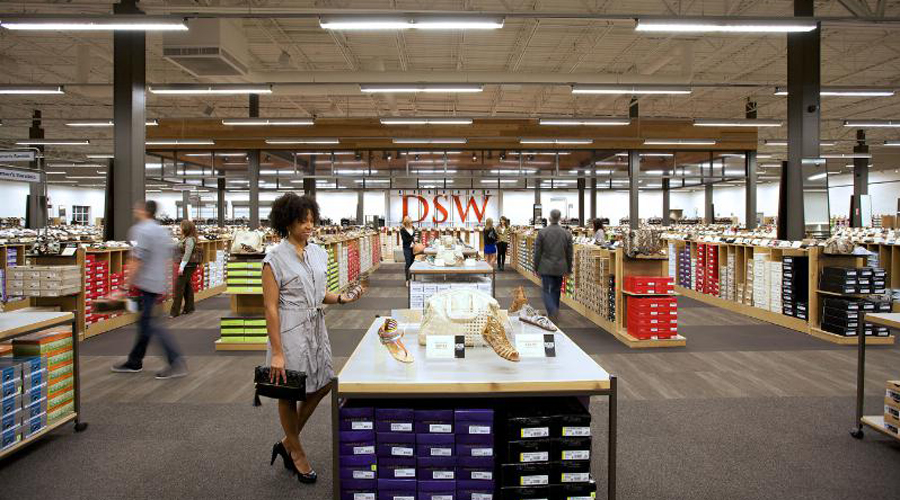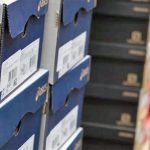Despite strong gains from beefed-up assortments of athletic product, DSW Inc. reported first-quarter earnings came in below year-ago levels and missed Wall Street targets.
While the footwear off-pricer maintained its earnings guidance for the year, its outlook for both comps and margins were slightly reduced. Shares of DSW closed at $16.21, down $1.44, or 8.2 percent, Tuesday on the New York Stock Exchange.
On a conference call with analysts, Roger Rawlins, CEO, said women’s dress, men’s dress and accessories were soft. From an inventory standpoint, DSW had pulled back on sandals while increasing investments in athletic and women’s dress prior to the quarter. He added, “It is played out well in athletic, but not as well in women’s dress and as a result, we are rightsizing our dress inventory while chasing the casual sandals.”
Excluding special charges, earnings declined 14.3 percent in the first quarter to $25.7 million, or 32 cents a share, short of Wall Street’s consensus target of 35 cents.
Adjusted earnings exclude pre-tax charges totaling $4.1 million, or 4 cents per share, related to the acquisition of Ebuys, restructuring costs and foreign exchange loss assumed in the process of pre-funding the upcoming Town Shoes acquisition. Net earnings fell 23.5 percent to $23 million, or 28 cents a share, from $30 million, or 36 cents, a year ago.
Sales increased 1.4 percent to $691.1 million, including $22.3 million of revenues from Ebuys. Wall Street on average was looking for $684.9 million on average. Comparable sales decreased 3 percent compared to last year’s 1.6 percent decrease.
Reported gross profit decreased by 180 basis points, driven by planned clearance activity and the addition of Ebuys, offset by disciplined markdown management and favorable sourcing costs. Reported operating expenses improved by 40 basis points, due to tighter expense management.
Discussing categories, Debbie Ferree, chief merchandising officer, said athletic continue to show strength in athleisure offerings with a good response to additions of casual sports styles. Athletic-inspired footwear is now close to a third of its business.
“We capitalized on a wider range of athletic-inspired choices that drove strong comp growth on top of last year’s challenging comparisons,” said Ferree. “Although we have been able to continue to impact the category mix our merchandise margin this quarter, we expect the growth of this category to produce a modest margin headwind for the balance of the year.”
Ferree noted the the athleisure strength represents solid demand for performance athletics and fashion athletic on the women’s and the men’s side that are not performance brands.
“We see this demand continuing through second quarter and even beyond. I haven’t seen this slowdown at all,” said Ferree. “And when you think about it, it’s really in our wheel house, the whole athletic, athleisure sport piece of the business that’s in the non-athletic brand. So we feel very comfortable that we’re growing both the athletic piece of the business and also the women’s piece of the business.”
In its seasonal category, women’s sandals were planned for a double-digit decline at the start of the season but performance has been stronger than planned. Said Ferree, “In hindsight, we positioned this category too conservatively and we’ve now moved into chase mode with the bulk of a sandal season still ahead of us, we’re bringing in additional receipts as we head into the peak selling season.”
In dress, open-up styles did well but close-up styles underperformed. Said Ferree, “We are evaluating ways to tactically drive growth in this category by focusing on top dress locations where demand is more constant.” On the positive side, response to fashion casual assortments has been good. She said driving positive comps in women’s remains the retailer’s top priority.
Similar to the women’s category, men’s dress was soft due to continued shift towards the casual and athletic styles and late receipts from a key vendor. In accessories, the trend was unchanged from the fourth quarter.
DSW has installed DSW Kids at 75 locations this quarter, which now bring kids to close to 60 percent of its locations. The stores have produced greater incremental sales than the first phase of its rollout.
Looking ahead, DSW said it was maintaining its guidance for adjusted earnings per share of $1.45 to $1.55. The guidance assumes comp will now arrive at a low end of its prior range that had called for comps be flat or show a low single-digit decline for the full year. Due to category mix and inventory management actions, gross margin is now expected to be lower than last year as the chain focuses on driving sales and gross margin dollars. DSW’s prior outlook assumed flattish gross margin for the full year. With an intensified focus on expense control, the chain now expects a low-single digit expense growth for the year versus mid-single digit growth previously.
DSW expects the front half of its year to be challenged by a website redesign, extra expense and minor sales disruption caused by Ebuys’ fulfillment center transition, an additional clearance rotation and Gordmans liquidation. On the other hand, the back half will benefit from the 53rd week, progressive results from its power store and key item initiatives and a more impactful contribution from its kid’s rollout during the back-to-school season.
“Big ticket items, personal technology and rising cost of healthcare have created headwinds from discretionary spending and made the customer more demand of value,” said Rawlins on the call.
On the positive side, he noted that recent recognition from The Harris Poll and Conde Nast’s 2017 Love List illustrates the strong brand equity that DSW has built, particularly among millennials.
The assortment initiatives started last fall have begun to improve assortment consistency on the selling floor. Key items penetration have now doubled while number of merchandising process, management and talent changes across its power stores have started to produce better customer service, more relevant content and stronger merchandising stories. For example, a Made in Italy collection in a number of its fashion doors have resonated with customers.
Additionally, store level marketing plans will begin later in the year aiming to reengage customers in its power markets “and drum up excitement for the changes we’ve made,” said Rawlins.
To enhance differentiation, DSW has secured the exclusive right to sell differentiated content from Adidas ahead of other retailers across the country. The off-pricer will also start to offer its first collection of Under Armor adults and kid’s footwear during the back-to-school season.
The company is also testing a new layout that creates significant additional capacity as well as “strengthening our visual merchandising in a way that presents product stories as powerfully in every warehouse as we do online.” The new layout enables DSW to reclaim 30 percent of its existing cubic capacity for future market share opportunities.
DSW also made a number of organization changes. Michele Love, who formerly spearheaded the expansion of Nordstrom Rack, joins DSW as EVP and COO. She will oversee all engagement with the DSW customer, including the digital experience. Jim Weinberg was promoted to DSW’s GMM of women’s footwear after two years leading its affiliated business group as general manager. Nancy Pastor, a seasoned executive from Macy’s and Payless, was hired as its new GMM of accessories.
“In conclusion, despite the challenging environment, DSW will be one of the few survivors of this retail consolidation, in a sea of sameness, we are singularly focused on creating great product and innovating new experiences that will nurture deeper, more meaningful relationships with our customer and inspire her to express herself through fashion,” said Rawlins.
Photo courtesy DSW
















